For Pulitzer Center grantee Ann Neumann, the civil war in Ethiopia is not a faraway conflict, although she is an American journalist. Through her connection to her veteran father, about whom she wrote in her first book, The Good Death, she feels tied to the United States military’s role in the Horn of Africa. When war broke out between the Tigray region and Ethiopian forces aided by Eritrea, Neumann’s understanding of the region’s history and her years of experience writing about tragedy helped her to grasp the devastation that would unfold.
The war in Ethiopia has led to “one of the world’s worst humanitarian crises,” according to Humans Rights Watch. Numbers vary by source, but hundreds of thousands have been killed, and the United Nations estimated that 13 million required humanitarian aid as of June 2022 as civilians starve and attempt to flee the country. The parties officially reached a cease-fire in November 2022. However, tensions remain high, disputes remain unresolved, and Tigrayans remain isolated without aid.
It would be Neumann’s first time reporting on war. Although her research on end-of-life care in the U.S. had prepared her in reporting on traumatic situations, the level of violence was new to her. But the conflict was going underreported for the international audience. Foreign journalists struggled to gain press access, and local journalists were silenced by authorities. Neumann decided that more media coverage was needed.
She pitched a series of angles on the story. Ultimately, she and her editors decided that the story that was most needed was a nuanced overview of the war, the history and political context behind it, and the disastrous impact felt far beyond Ethiopia. This story became “Falling Like Leaves: The War in Ethiopia and its Crimes Against Civilians,” published in Harper’s Magazine in January 2023.
A second story for her Pulitzer Center-supported project, Who Owns the Nile? Ethiopia's War Against Itself, will be published in the spring edition of The Baffler. The upcoming story will focus on the construction of the Grand Ethiopian Renaissance Dam on the Nile River, and the resulting diplomatic conflict between Egypt and Ethiopia.
Pulitzer Center Editorial Intern Grace Jensen spoke with Neumann about her personal connection to Ethiopia, her experience reporting on war for the first time, how she approached reporting the conflict as an outsider, and the lessons she’s learned.
This interview has been edited for length and clarity.
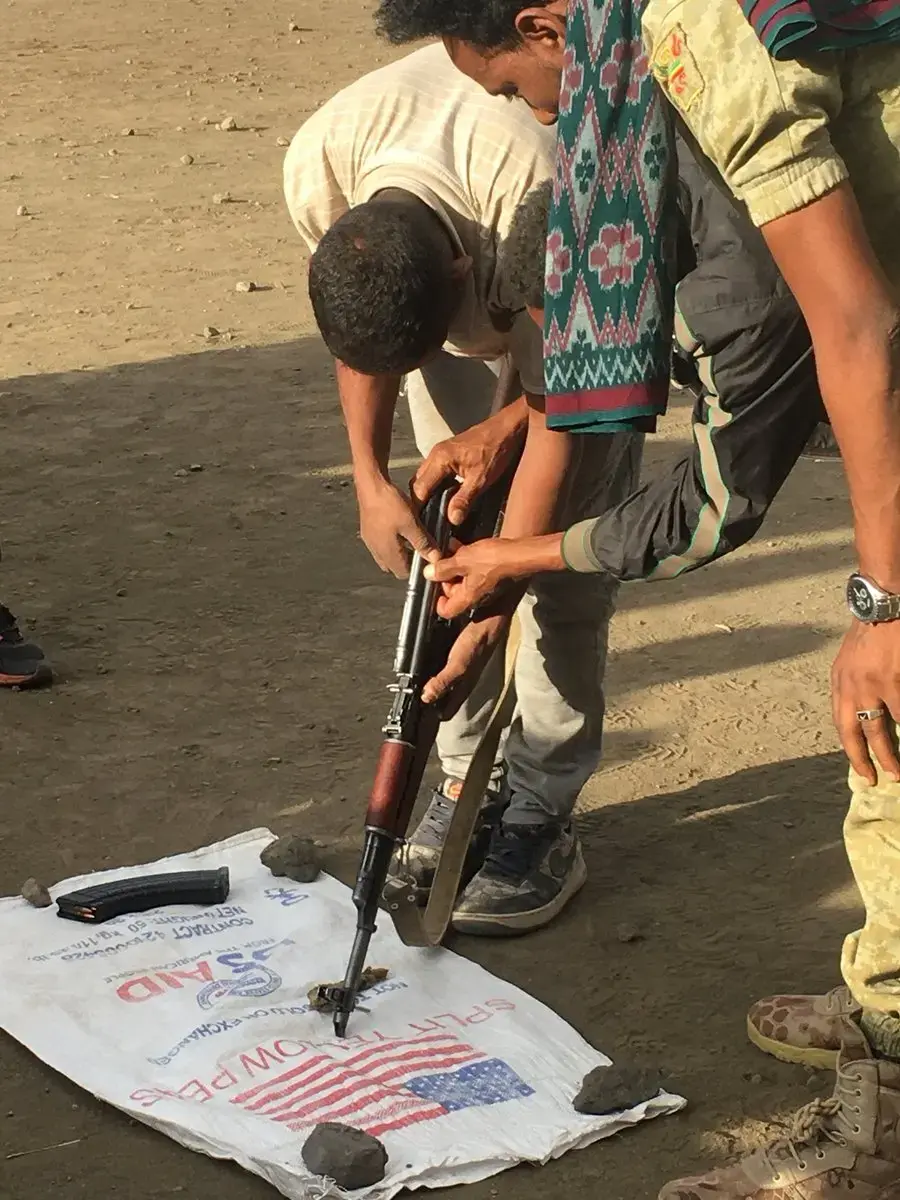
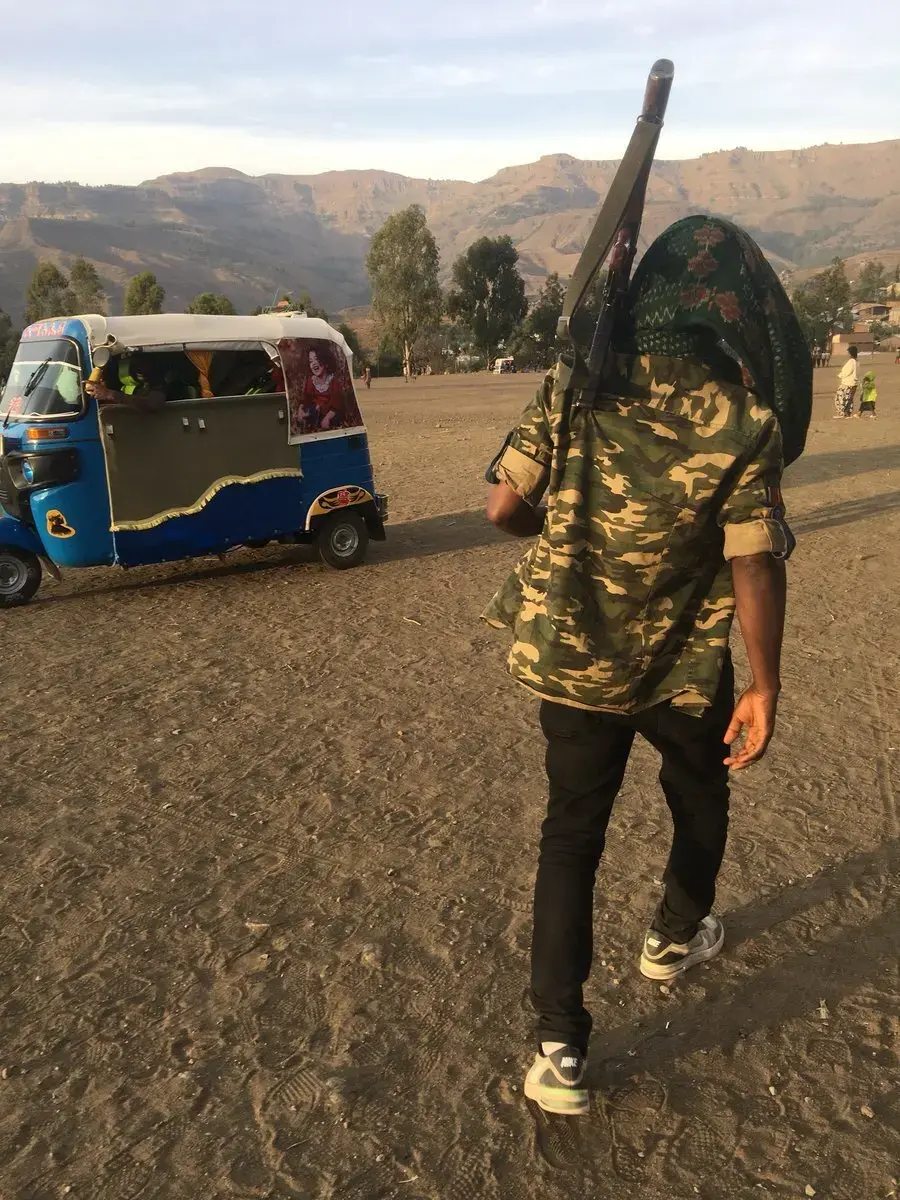
Grace Jensen: Could you tell us a little bit about yourself and what drew you to this reporting project?
Ann Neumann: Yeah, I'm Ann Neumann. I'm a journalist and author. I wrote a book in 2016, called The Good Death. So I have been writing about end-of-life care, and particularly elder care, in the United States for at least a decade. So death and dying, and in some cases, violent death and dying in the U.S. I've written about incarceration and other issues. My first piece for Harper's Magazine was about a pattern in the United States of elderly couples who are choosing to end their lives together. So, the material and end-of-life issues are not foreign to me. But Ethiopia is seemingly out of my bailiwick, right? So I have had some acquaintances say to me, “How did you end up going to Ethiopia to write about this story?”
But I brought you a little show-and-tell piece. It's an artifact that I inherited from my father. But it connects me to Ethiopia, and Ethiopian violence, in an interesting way. It is a machete that my father brought back from his time in Ethiopia, in 1964. He was in the U.S. Army. The U.S. Army had a classified base in what is now Eritrea, but was then Ethiopia. So I grew up with these artifacts and the stories of Ethiopia, and very much an interest in Horn politics. My father's legacy, which, of course, is the legacy of American empire around the world. The United States played a large role at the point when the British ran the Italians off the continent.
So that was my interest. I've been following Ethiopia for years, and I'm working on a book now about American empire. It's in the works. So I had been watching Ethiopia quite closely. ... I was just there in 2019. So this is a part of the world that I spent a lot of time in. When the war began in the fall of 2020, I was destroyed, all I could do was watch the news. And a friend said to me … you should go. I was like, I don't know. I haven't been in a war zone before. It was intimidating, and I didn't know that I had the chops or even the right to write the story. I mean, all of us have read those into those pieces, where a white person kind of dropped in and said, "This is what's happening, and the only way I know it is through this guy who's interpreting for me here on my left," and I didn't want to do that. So I thought about it for a long time. I pitched the story around. A number of places didn't want it, because we know, it's an Ethiopia, it's an Africa story. So there are only a few outlets for those large type pieces. And knowing Ethiopian history in the lead-up to this war, I knew it wouldn't be a good, short, easy piece. It's an incredibly complicated history, as you know from the piece.
So I was lucky enough to find a new editor at Harper's. I think I wrote three different pitches for them. One was about American empire and my relationship to Ethiopia, one was about the American use of surveillance in the Horn of Africa. And ultimately, we decided that nobody else was writing about this war. This war was so devastating, the number of civilians dead is more than half a million—that's just civilians, we suspect that there are more soldiers who have died than that—so more than a million people, that's speculation. But the scale of and the horror of this war astounded us and we felt the need to really focus on the atrocities.
Another challenge with the piece was that Tigray has been cut off from the rest of the world since the start of the war. And indeed, even in peace now for several months, much of the state is still without electricity, or internet or cell service, or banking, or certainly food aid. The federal government's only allowing those services and aid into the parts of the state that they control. So without the ability to get into Tigray, and I knew that I wasn't up for that, I was not going to try to cross the border, not only for my own safety, but for those I would endanger trying to do so. I decided that with the data that we had coming out of Tigray with interviews that were being done with refugees in Sudan and elsewhere, what I would do is tell the story that I could get in Addis Ababa and Lalibela. So in the piece, I get to talk to Tigrayans who were detained. I speak to Amhara who were raped. I speak to Amhara refugees in Cairo, who were witnesses to a massacre. And on the whole, I'm saying this is what this war has done. It has harmed everyone, and so much is unknown, that there's no good guy here, right? There's no good guy.
So to answer the question of "Whoa, how did I end up in Ethiopia?" It's really, I got there, and I was on my feet immediately. I realized that the lessons that I had learned, over I don't know how many years of reporting in traumatic situations, although this was much more violent than I had encountered, those skills were still sound. I say that as an encouragement to anyone who has the interest in working on pieces that seem out of their reach. By all means, stay safe yourself, but trust that your skills will translate to other locations. You know, I needed an interpreter so I found an interpreter, right, it's just you do what you have to do to get the job done.
Also, because the country was so good at keeping the message, I was going to say keeping the message tight, but that's not really true. What they did was deport international journalists that they detained or disappeared, their own journalists either in Tigray or the rest of the country, and then on social media, it's just been melee. It's been a mess where there's this disinformation machine that undermines any credibility. So when I was in the country, I was very quiet about where I was. When I was interviewing a cabinet minister who closes out the piece. I actually stayed at the incredibly expensive, but very secure, Sheraton [hotel]. Every night after my reporting, I would photograph my notes and upload them to the cloud, all my interviews, same thing. I was just worried about losing the material that I was getting.
But on the whole, I can't say I enjoyed the reporting. The material was just too devastating. And my challenge was great. I had to humanize the individuals ... humans who were in a horrible situation, and bring a war to the general public, a war that had been completely off the Western radar.
"I realized that the lessons that I had learned, over I don't know how many years of reporting in traumatic situations, although this was much more violent than I had encountered, those skills were still sound. I say that as an encouragement to anyone who has the interest in working on pieces that seem out of their reach."
GJ: So seeing your dad's connection to Ethiopia, what was it like for you to go to a place where you had this family connection, but now you're going as a journalist, as opposed to the military, which are very different? How was that?
AN: I mean, as you would imagine, like what is my right to be here? I've been to both places. I've been to Ethiopia a number of times before, it was really Eritrea. [It’s] one of the most authoritarian countries in the world. And so people are afraid to talk to you. Your purpose there is always suspicious, the outside world is suspicious to anyone there. And yet Eritreans are leaving the country in droves because Isaias Afwerki, the president [of Eritrea], has instituted indefinite military conscription. He has this deep surveillance network throughout the country and families can be punished for outspoken members. It's a crazy place.
So to be there, I mean, I don't think it's possible for an American who's never left the States to understand what an authoritarian country is like. So what did I bring to this? I brought to Eritrea, certainly, and the Eritrean refugees that I met in Cairo, a deep sense of interest, and some sort of role in the state of their life. It was the Americans who worked to keep Ethiopia as the ruler of Eritrea for a long time. It was Isaias Afwerki, who worked … to fight for the independence of Eritrea for 30 years. That was achieved in ‘91, finally, and everyone thought liberation would then come to both countries. And Isaias just couldn't let go. He continued in his increasingly authoritarian ways, and I think the United States has long struggled with that with foreign politics, and not very successfully.
So to be an American, where I can come and go through the borders that have been impassable to so many or have been the sight of leaving their homeland ... I interviewed an Eritrean refugee in Cairo, and we were sitting on the floor, as is common, and after the interview, she told me about her flight from Eritrea and her rape by her smuggler, she crawled across the floor and her hands and knees and vomited in a trash can. It was incredible to know that for all the power and wealth of the United States, there were people who were living under the long arm of American empire and failed foreign policy. That's something I am privileged to carry.
"I basically just said, I am here to listen, tell me what you want."
GJ: So how did you work through that, coming into it as an outsider, when you were speaking with your sources, how did you approach them?
AN: I told them who I was, I told them what my tentative connection to the place was, but I basically just said, I am here to listen, tell me what you want. It's impossible to disappear. Right? I'm a white person, middle-aged, white blonde woman in Ethiopia, war-torn Ethiopia. And yet, if I could get them talking, however awkward it was, whether it was in English, or how awkward through interpreters, if I could get them to talk, because I think Ethiopians had felt so unseen.
While there's a huge movement in the country right now saying Europe, America, hands off Ethiopia, those are primarily [Prime Minister] Abiy [Ahmed] supporters, and a minority, to be honest. There are a lot of people who are saying, "United States, where have you been? Why are you not interceding? Why are you allowing what many are calling a genocide, what many are calling just horrific warfare, why are you allowing this to happen?" I think there is a, if not a responsibility, the United States is waning in its power since the end of the Second World War, but our foreign policy does make a difference. That impact is felt everywhere.
GJ: Yeah, I wanted to ask you about the American media. Do you think that this war in general has been underreported for a Western audience? How do you think that the average American understands something like the war in Ethiopia? What kind of coverage is needed to educate the American public?
AN: Yeah, I think the story was such a heavy lift, because we knew so little about Ethiopia as a general population. You know, when I say Ethiopia, what do you think of? Coffee, maybe, and the Feed the World campaign in the ‘80s, for famine. We don't talk about the fact that that famine was caused by the current ruler of the country, another instance of food being used as a weapon of war. And we just don't understand what's going on in Sudan, Somalia, any of the other countries in the Horn of Africa. And quite often, we don't think of Ethiopia as this ancient country with an ancient history. We think more of, say, Egypt, which has this Western-facing facade and story.
So all of that lifting had to be done. I think that's really daunting. So a lot of the folks who'd kind of dropped in and did short pieces about, look at this war that's taking place in the Horn … But the depth and the vitriol and even the origin of the states, the 11 federated states of Ethiopia, even the structure of the nation itself, just takes a lot of explanation. So that's daunting when you want to explain the war.
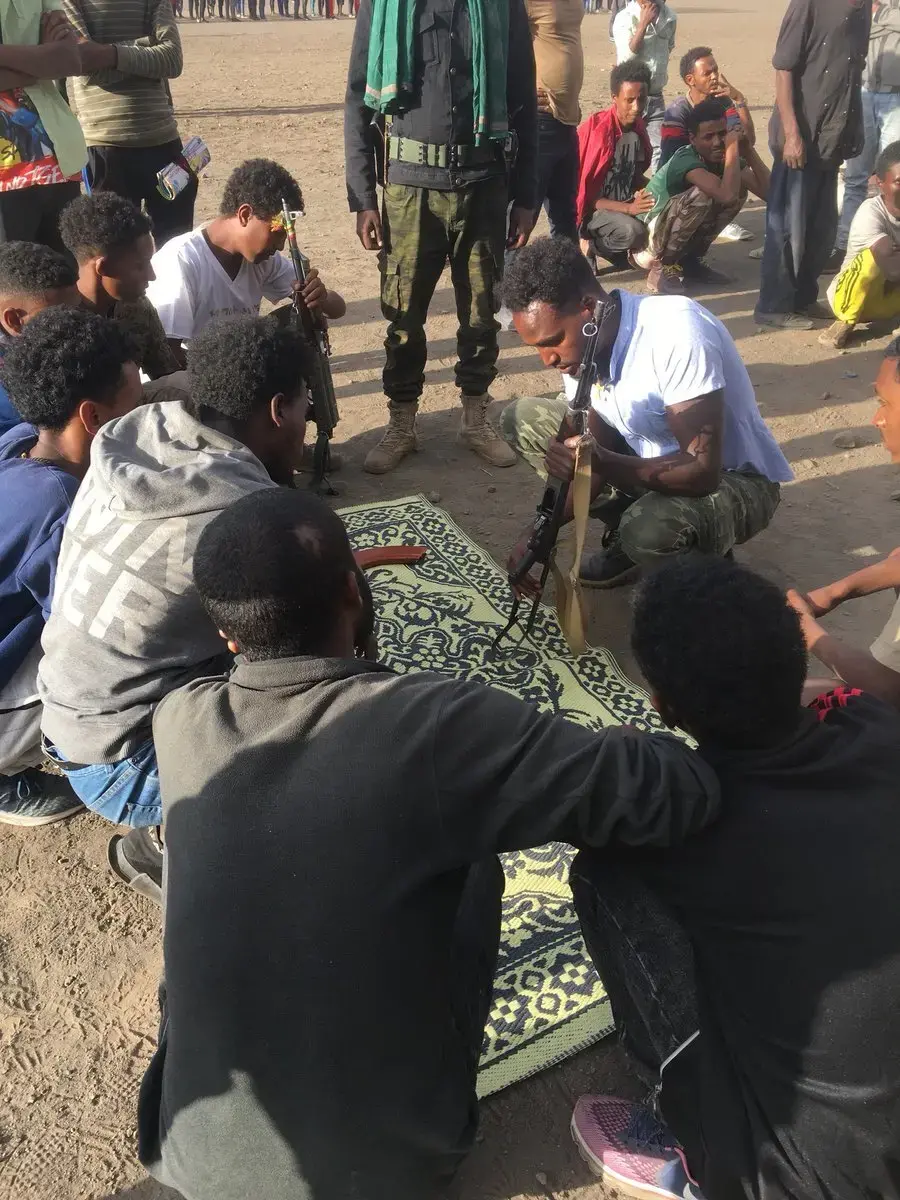
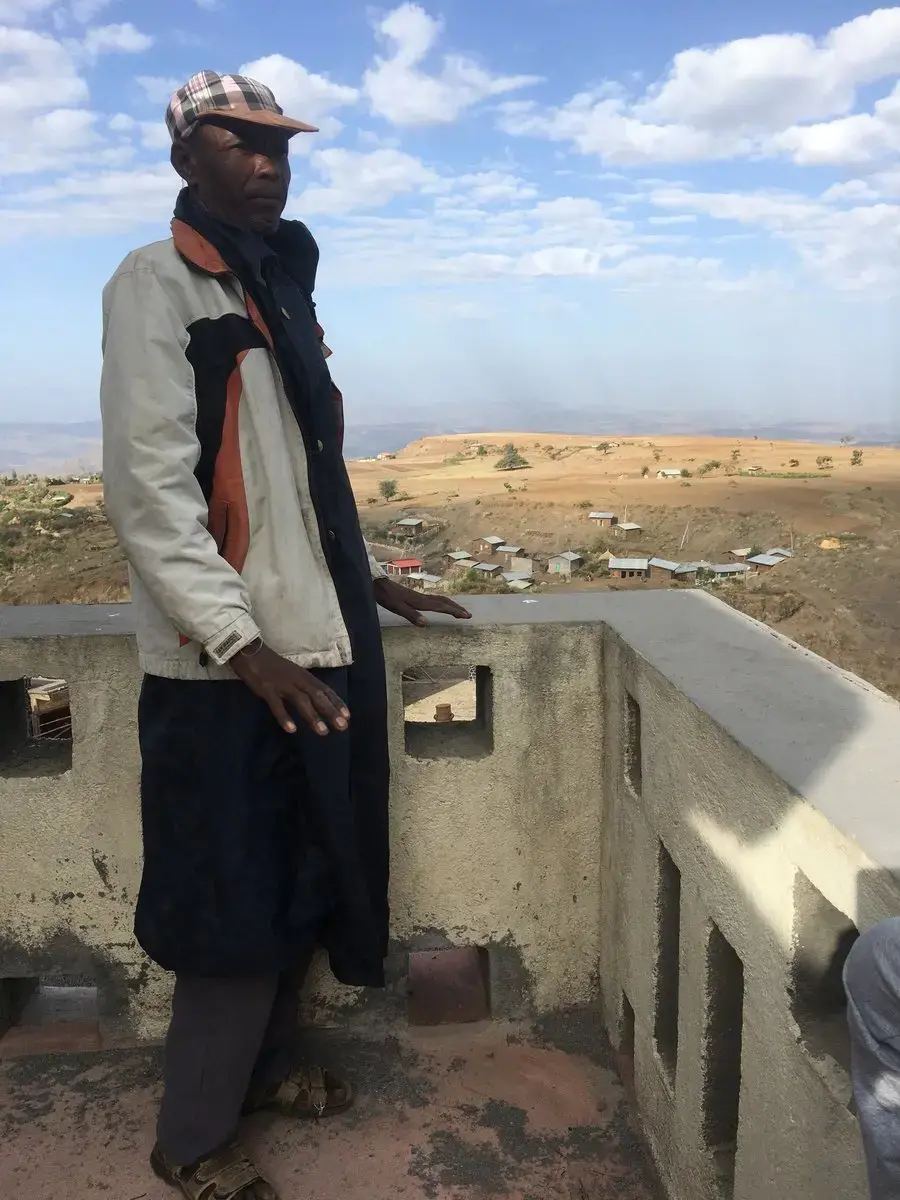
"We have failed as a media to represent people and places on farther away continents, who aren't white, predominantly; we've failed to represent them as human beings with futures and politics and education."
Another factor, I think, is we're just so obsessed with our domestic politics at the moment. Like it's been ... hell since, well, for a long time, but particularly a dramatic version of hell since the rise of Donald Trump and his strong-arm, ridiculous foreign policy, the slide into Biden with this hangover of election lies and misinformation, and then Biden's relatively nonexistent foreign policy ... So that's another thing; we're distracted. We're preoccupied. ... If there is an international story that has caught our attention, it's Ukraine, because we thought Europe was settled, we thought we had a big hand in settling Europe and that peace would reign and that Putin could be contained. So I think Ukraine has taken a lot of air out of the room.
But largely, it's just racism. I mean, I think that's probably the first and last issue that we're facing now. We have failed as a media to represent people and places on farther away continents, who aren't white, predominantly; we've failed to represent them as human beings with futures and politics and education. Some of that is just, I guess, akin to what I did, it's the fact that all we hear is horror stories from the [African] continent, South America, Southeast Asia, elsewhere. But also, just because we haven't humanized the individuals who are living these experiences. I just wanted to show that these lives matter, these experiences matter, regardless of where they are.
GJ: That was something I was really impressed by when I was reading your piece, is just how much history you go into. You really dive into this historical analysis. So I'm wondering how that is for you as a journalist, combining history with real-time reporting.
AN: Oh, I love it. I mean, what's more interesting than a well-contextualized personal story? And I think that's always where I want to be. How do you understand a war if you don't understand the personal experience of it, or the history of it? So I think they always have to go hand in hand.
This piece was so many things before it hit print … And I think we would have had more time for maybe more flourish, more beautiful writing, more character sketches and studies … It's simply because we only had 6,000 words, there were so many things that we could have done if we had, say 20, which is probably how many I wrote. So we couldn't get everything in. But I'm really pleased that we felt that this history was absolutely necessary. Our understanding of these politics matter in how our country relates to this region of the world.
GJ: Pivoting a little bit, I did see that most of your past experience was in writing about death and dying. So I'm wondering how that informs your reporting of a war zone, and if this knowledge of death and dying did anything for you when you were talking to people experiencing these things?
AN: Yeah, I think that's good, right, and that's something that I haven't thought a lot about. I just felt my early trepidation, and then I got there and I was like, OK, I know what I'm doing. I've interviewed rape victims before, not with that kind of experience, like war rape, systemic rape, I hadn't encountered. These are incredible accounts that are really heavy. The guy that I met in Cairo who had witnessed the Mai Kadra massacre, which was one of the first massacres in the war. He rides to this little town on a tractor to look for his uncle. They had heard that the massacre had taken place and bodies are lining the road and he spends the day helping whoever's left behind to bury. There's no way to handle that. As one who's experienced it, or as one who's trying to capture the story and get it accurate.
But there are tools, right? It's kind of like grief, like you never cease to grieve your loved ones, it always hurts. You just get tools, you learn how to carry it. And I don't know that I have, but I'm working toward it. I was not anywhere near violence, I felt very fortunate. I was around people with guns, I was in places where there had been a lot of violence, I was around people who had either perpetrated or experienced a lot of violence. But it's quite different than someone like (photojournalist) Lynsey Addario, who is in Ukraine right now, hiding behind snipers. So my experience was quite different from "bang bang." I wasn't in that scenario.
But also, I've spent a lot of time with corpses or dying people. So I think while that's something quite different, it helped me to retain my composure in really challenging experiences. Also, constantly reminding myself that what I was surrounded by was deeply human. These were not savages. I mean, these were horrible acts that occurred within the context of war. But these were still human beings who were experiencing and perpetrating them. That was compelling to me in that I wanted to know why.
"This was something that felt deeply personal, although you'd never get that from the article, but to me I think it feels like my dad would appreciate it."
GJ: What lessons did you take away from this experience? What lessons do you hope that readers will take away from your piece?
AN: That history is really interesting, and it matters. That as a global community, we have a responsibility to the pain and suffering of others, no matter where they are. That foreign policy matters, that humanitarian aid access matters, that our relationship with Putin matters, these are not things that can be easily brushed off, or done in a half-a--ed way. We have an obligation to see war, pain, and suffering injustice, and to still hope that there is a way despite the decline of American neoliberal, we're going to save the world, despite the decline of that vision, we must have another vision. Because these are fellow human beings. So I'm hoping that the piece makes the history and the condition there readable and compelling, accessible, and something that should matter to all of us.
What did I learn from it? I found it the most satisfying work I've done so far. I mean, it's really great to write a book. It's really great to see a book come into print. That is probably the other highlight in my career. But this, this was something that felt deeply personal, although you'd never get that from the article, but to me I think it feels like my dad would appreciate it.
GJ: That's great. So what do you have planned next? Is there anything that you're hoping to accomplish in 2023? I know your second story for the project hasn't been published yet, but I'm looking forward to that.
AN: Yeah, thank you. The second piece will run at The Baffler, which was a place that I've been writing for for a long time. So the piece that they will publish in their forthcoming nationalisms issue is about the grand Ethiopian Renaissance Dam, a project that was begun, I think, before 2012. This dam that will be the largest of its type on the African continent, and that Ethiopians have contributed their own hard-earned money to build. It has a lot of Chinese financing as well. But what the dam has done is cause great friction with neighboring Sudan and Egypt, particularly Egypt, which is defined by the Nile, which lives by the Nile … And then Ethiopia, which has this prime minister who's increasingly authoritarian, who was shutting down media, who was moving the country away from any semblance of democracy, for the sake of his own power, and who's pushing this dam, and doing so unilaterally, and maybe isn't going about this dam building in the best possible way for Horn relations. So I'm excited about that piece coming out.
But I think I'm always going to be working in kind of my wheelhouse territory, maybe not so wheelhouse anymore. But I'm working on a piece about the undermining of the medical definition of brain death, and how it interacts with organ donation in the country. I'm not sure where that piece is gonna go. But I'll be in California next week reporting that.
GJ: So back to Ethiopia. What further coverage do you think we need? If you could just continually keep publishing pieces about Ethiopia, what would it be?
AN: Oh, if we could, as a media, continue writing about the peace process, because it's incredibly troubled. A lot of the issues, like Eritrean involvement, like the territories in western Tigray that are now occupied by Amhara Special Forces, and Eritrean soldiers, and the Fano … So those regions were never discussed in the peace deal. And I have no idea how they're going to be resolved. Also, there are a lot of Tigrayans who have suffered incredible things. But we still don't know because much of the state is still under siege, basically.
I think that there are huge issues with the economy of Ethiopia. And the economy is a big deal; the United States has partnered with Ethiopia over the decades and Ethiopians have fought the American-imposed war on terror … And when the U.S. federal government relied on Ethiopia as its stable state in the region, the U.S. government was willing to overlook a lot of injustice inside the country. And it seems as though that is still the pattern, simply because our foreign policy has not kept up with the Abiy government and their changes. He was hailed as the first peaceful, bloodless new leader, but has turned into a warlord. And what's taking place in Oromia, for instance, is still devastating, has many of the same causes as the war in Tigray, and that is unresolved. So I think the United States has an obligation, I think the media has an obligation to pay attention to these issues, because it's not just confined to the state of Ethiopia. It has huge ramifications elsewhere.
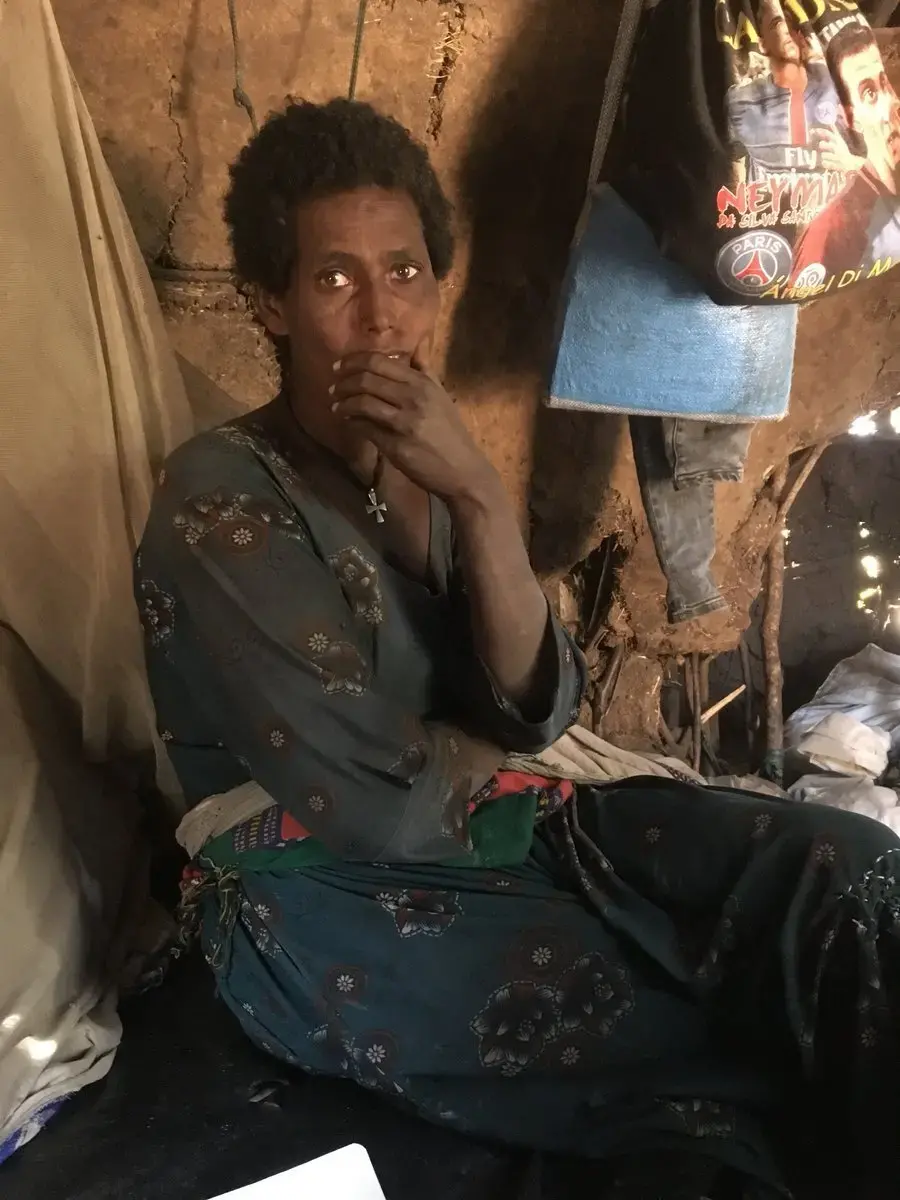
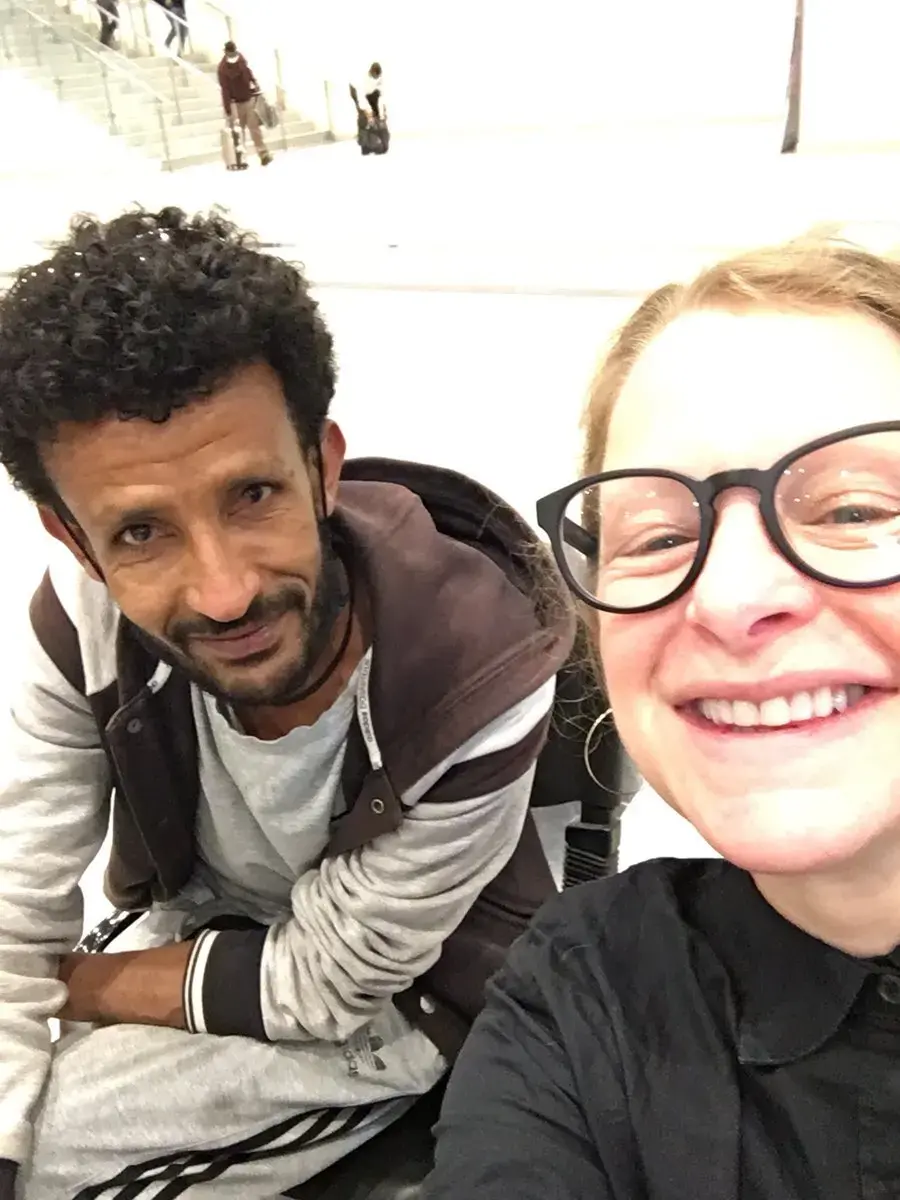
GJ: What advice would you give to other journalists for going in to cover a war zone for the first time?
AN: Yeah. I was not in a war zone, I was in places that had seen war and had experienced war. There's a huge difference. I don't take that for granted, I would not have gone and I did not go into Tigray, I did not feel like my life was threatened at any point in time. So the kind of reporting that I've done is quite different from war reporters' work. I don't know how they do what they do. My loved ones alone, would be too much of my forethought. That's not what I do.
However, reporting is reporting. And whatever situation you find yourself in, safety is important. The safety of the people around you is important. Being honest and true, and paying attention to detail and tracking your notes, and getting it right, and maintaining relationships with the people on the ground. Just absolute professionalism will take you anywhere, whether you're, I don't know, at a Club Med in the Bahamas, or in an abortion clinic in Cincinnati, or in Lalibela, a place that had been held by rebel soldiers for five months.
GJ: Is there anything else that you want to add that I haven't covered?
AN: I found the people that I met [and] worked with on this story, both here and there, to be so compelling and wonderful. I'm texting with everyone, every day all the time. I think maybe that's a good endnote, that this is not just a career. These are friends for a long period of time. These relationships establish something much longer-lasting than a print article.










